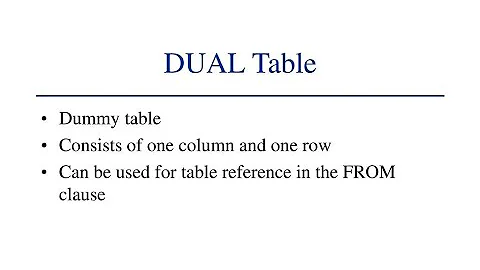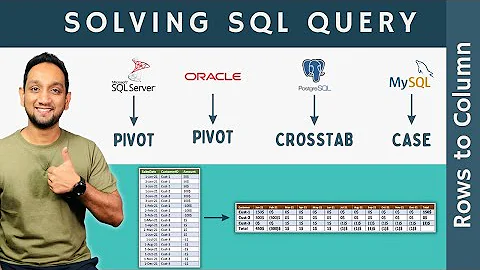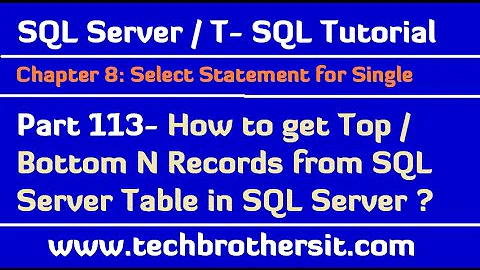SQL Query to return N rows from dual
Solution 1
You could use:
WHERE ROWNUM <= :NUM
...but the table has to contain row equal or greater to the limit in the bind variable. This link demonstrates various row number generation techniques in Oracle.
Using CONNECT BY, Oracle 10g+:
SELECT LEVEL
FROM DUAL
CONNECT BY LEVEL <= :NUM
Confirmed by monojohnny that the bind variable can be used. Attempts to run on Oracle 9i, though CONNECT BY syntax is supported results in an ORA-01436 error.
The only thing I'm not 100% on is if the CONNECT BY will accept the limit from the bind variable.
Reference:
Solution 2
Try something like:
SELECT 1 AS Val FROM dual
UNION ALL SELECT 2 FROM dual
UNION ALL SELECT 3 FROM dual
UNION ALL SELECT 4 FROM dual
UNION ALL SELECT 5 FROM dual
UNION ALL SELECT 6 FROM dual
UNION ALL SELECT 7 FROM dual;
It's messy, but it'll do the trick.
Edited: Ah - you need to pass in a variable to let you know how high to go...
So how about something like:
SELECT t1.Val + t2.Val * 2 + t3.Val * 4 + t4.Val * 8 AS Val
FROM
(
SELECT 0 AS Val FROM dual
UNION ALL SELECT 1 FROM dual
) AS t1,
(
SELECT 0 AS Val FROM dual
UNION ALL SELECT 1 FROM dual
) AS t2,
(
SELECT 0 AS Val FROM dual
UNION ALL SELECT 1 FROM dual
) AS t3,
(
SELECT 0 AS Val FROM dual
UNION ALL SELECT 1 FROM dual
) AS t4
WHERE t1.Val + t2.Val * 2 + t3.Val * 4 + t4.Val * 8 <= 7;
Ok... editing again, now using WITH:
WiTH
A0 AS (SELECT 0 as N FROM DUAL UNION ALL SELECT 0 FROM DUAL),
A1 AS (SELECT 0 as N FROM A0, A0 AS B),
A2 AS (SELECT 0 as N FROM A1, A1 AS B),
A3 AS (SELECT 0 as N FROM A2, A2 AS B),
A4 AS (SELECT 0 as N FROM A3, A3 AS B),
A5 AS (SELECT 0 as N FROM A4, A4 AS B),
A6 AS (SELECT 0 as N FROM A5, A5 AS B),
Nums AS (SELECT ROW_NUMBER() OVER (ORDER BY N) AS Val FROM A6)
SELECT *
FROM Nums
WHERE Val <= :NUM
;
Solution 3
I didn't come up with this answer [ so make sure any votes go the right way!!] , it just my testing notes based on 'OMG Ponies' [who wasn't sure whether the method would work with binding variable] above for reference:
Connected to:
Oracle Database 10g Enterprise Edition Release 10.2.0.1.0 - Production
With the Partitioning, OLAP and Data Mining options
SQL> var num_rows number
SQL> begin select 20 into :num_rows from dual;
2 end;
3 /
PL/SQL procedure successfully completed.
SQL> select level from dual
2 connect by level <=:num_rows;
LEVEL
----------
1
2
3
4
...
Solution 4
Query without connect by
WITH num(n) as(select 1 from dual union all
select n+1 from num where n <= :num_limit)
select * from num
Related videos on Youtube
Harish
Updated on July 09, 2022Comments
-
Harish almost 2 years
I want to write a SQL query which accepts a bind variable (say :NUM) and its output consists of one column & :NUM number of rows, each row having its row number. i.e. if we pass :NUM as 7, the output should be:
VAL ==== 1 2 3 4 5 6 7There shouldn't be any actual DB tables in query and no PL/SQL code should be used. i.e. only dual should be used in the query
Is there any way to achieve this?
-
Rob Farley over 14 years...then you continue the pattern as required. You could use a recursive CTE, but I'm not sure what the Oracle syntax is for that. You could also use a row_number style approach.
-
OMG Ponies over 14 years@Rob: Oracle support for recursive WITH clauses starts 11g iirc.
-
Mark Byers over 14 yearsI think from the mention of 'PL/SQL' and the 'dual' table that he wants a solution for Oracle.
-
Mark Byers over 14 years+1 This method is also suggested here: adp-gmbh.ch/ora/sql/examples/generate_rows.html
-
 Kobi over 14 yearsThis gives me an error for any value above one.
Kobi over 14 yearsThis gives me an error for any value above one.SELECT LEVEL FROM DUAL CONNECT BY LEVEL <= 20: ORA-01436 -
 Kobi over 14 yearsGood point, it worked on a a newer server (10g), but not on 9.0.1.5.0. Other options from your link work well, though.
Kobi over 14 yearsGood point, it worked on a a newer server (10g), but not on 9.0.1.5.0. Other options from your link work well, though. -
monojohnny over 14 yearsWith regard to this working with a bind variable: I tried it and it does work (used 10.2.0.1.0): I'll post an answer to this effect for reference.
-
Rob Farley over 14 yearsYeah, but I'm not sure if it's the same as in MS-SQL.
-
Jeffrey Kemp over 14 yearsDUAL is the best way to perform this kind of thing - in 10g+ Oracle gives FAST DUAL which involves zero block reads. DUAL will almost always outperform home-made tables.
-
 paxdiablo over 14 yearsNo doubt, but we don't use just Oracle. The solution we have is vendor-agnostic and performs more than fast enough.
paxdiablo over 14 yearsNo doubt, but we don't use just Oracle. The solution we have is vendor-agnostic and performs more than fast enough.








